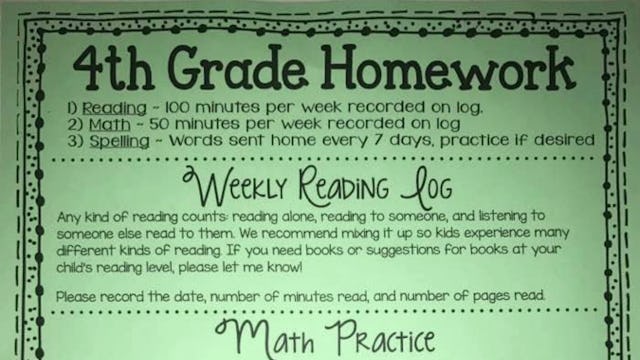Why This Teacher's Homework Policy Is So Amazing

Like many parents out there, I hate homework I have some very mixed feeling about homework. I have seen the research suggesting that homework in elementary school is actually ineffective, and it seems to me that what young kids need most is time to unwind, play, and just be kids when they come home from six long hours of school.
As my kids get older, though, I do see the point of teaching them personal responsibility when it comes to schoolwork. Still, I don’t want my kids coming home and doing endless ditto sheets — creative, project-based homework makes much more sense.
Whether or not you are for doing away with homework altogether, I think we can all agree that it needs a bit of a makeover.
One forward-thinking teacher in Eugene, Oregon, might just have the vision that we’ve all been looking for. Mel Dormer, whose daughter attends Howard Elementary in Eugene, shared her daughter’s fourth-grade homework guidelines with Scary Mommy recently, and we were absolutely blown away. In a good way.
Check it out here:
Mel Dormer
(Click to enlarge)
This teacher is calling on all parents to decide for themselves if homework is valuable for their kids. And if they decide that it is, she offers some creative and engaging ways for her students to continue learning at home.
Oh my goodness, thank you.
At the bottom of the handout, this awesome teacher lays out the basic concept behind the guidelines. “I do not have in-class rewards or consequences for homework since I’m not in charge of whether it gets finished,” she writes. “Whether or not you do homework is a family choice. Students will receive a homework grade on their report card, but students will not miss out on any class activities or receive prizes for homework. It’s up to families to decide if homework is a priority.”
I want to hug this woman.
The truth is, we all know our children best. In most cases, we can tell if homework seems to be of benefit to our children — or not.
In fact, Dormer tells Scary Mommy that many teachers at Howard Elementary are moms of young kids themselves and really do get how hard it is to balance everything during the average school day, which is one of the reasons why homework policies at this school tend to be flexible.
Of course, there are parents out there who might find it difficult to determine if their child would benefit from homework or not, and this teacher does specify that if parents have any questions about the policy, they can always discuss it with her, which sounds like an excellent plan to me.
Dormer tells Scary Mommy that engaging in homework time ended up being the best choice for her daughter, especially since the options for completing this teacher’s homework were much more palatable than the traditional kinds of homework that are usually assigned.
Which leads us to perhaps the most incredible aspect of these homework guidelines: the flexible, creative choices the students have in terms of what “counts” as homework.
This teacher assigns homework in three categories: reading, math, and spelling. Rather than having homework due every night, she gives a ballpark estimate of how much time should be spent on each subject, and then asks that the students record the completed work on a homework log to be turned in by the end of the week.
Pretty cool and refreshingly simple, huh?
And now check out the kinds of assignments this teacher assigns in each category.
Children are asked to complete 100 minutes of reading per week, divided up into any time increments that they like. The teacher is also open-minded in terms of what counts as reading. “Any kind of reading counts,” she writes in the guidelines, and explains that this can include reading out loud, silently, and being read to by someone else.
But it only gets better. Math homework (which I’m pretty sure is every parent’s nemesis these days) should consist of 50 minutes per week, and there are no annoying Common Core worksheets to contend with. Kids can choose to do a fun math program online (which Dormer says her daughter loves) or use math as part of everyday tasks like cooking — which means that homework can actually become a fun family bonding experience. Imagine that.
As for spelling, students receive spelling lists tailored to their developmental level (fantastic!) and whether or not to study them is optional.
Again, that lovely word: optional. It just makes me giddy to think about the idea of homework being an educated decision a parent and child get to make together rather than a dreaded obligation. It just makes so much sense, doesn’t it?
Dormer tells Scary Mommy that her daughter’s after school life has gotten so much better since this new homework policy was adopted — and her educational growth has not been negatively affected at all.
“It’s more fun for her because she has a really cool math app that’s like a game with a story line — she’s a huge gamer, and cooking together as a family for homework gets us to do things together and have fun doing it,” Dormer shares. “The years that she had homework, there were tears of frustration and bribing constantly.”
Thankfully, more and more school districts around the country are adopting policies like the one at Howard Elementary School. I don’t think homework was ever intended to be an overwhelming battle, but sadly, it is has become exactly that for far too many students. We need to change that, and hopefully school districts all over will start to explore some new and improved options like this.
This article was originally published on